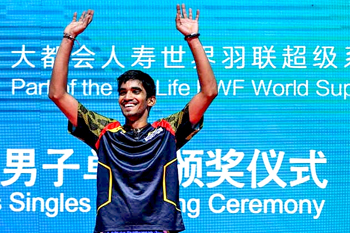 Hyderabad, Nov 18: A day after his monumental China Open Superseries victory, Srikanth Kidambi has yet to let the enormity of his achievement sink in. More than the historic Superseries title, India’s first by a male shuttler, it was the manner in which he won it that makes it special.
Hyderabad, Nov 18: A day after his monumental China Open Superseries victory, Srikanth Kidambi has yet to let the enormity of his achievement sink in. More than the historic Superseries title, India’s first by a male shuttler, it was the manner in which he won it that makes it special.
In an imperious display of badminton, Srikanth dismantled the legendary Lin Dan in straight games and deftly added his name to the history books. "I’m extremely excited that I won a Superseries, that too by defeating Lin Dan on his own turf,” Srikanth told his newspaper from Hong Kong on Tuesday.
Srikanth, who trains at the Pullela Gopichand Badminton Academy in Hyderabad, dedicates this win to coach Gopichand, who turned 41 on Sunday. “This is my gift to Gopi sir on his birthday.
He has played a huge role in shaping my career. He gives me immense support and also trusts me to go out there and play my own game. That gives me a lot of freedom to express myself,” Srikanth said.
Srikanth reckons his victory over the ‘God of Badminton’ is at the top of the best year of his career thus far. “This has been a really good year for me. I had finished well at a few tournaments, won the China Open, and I also improved my world ranking considerably.”
Srikanth began 2014 at No.47 in the world, and has since risen 16 places. Rarely does India have a presence in a men’s singles Superseries final, and when that final is against Lin Dan, China’s two-time Olympic and five-time world champion, there are boudnd to be nerves. Not for Srikanth, though.
“I was more excited than nervous,” Srikanth said. “To play in a Superseries final, and that too against Lin Dan was like a dream for me,” the 21-year-old said. “And the dream came true when I defeated Dan,” he added.
Srikanth has a tricky opener at the Hong Kong Open Superseries, which flags off on Tuesday. In his first round match on Wednesday, India’s latest hero takes on the seventh seed from Chinese Taipei Tien Chen Chou.





Comments
Add new comment